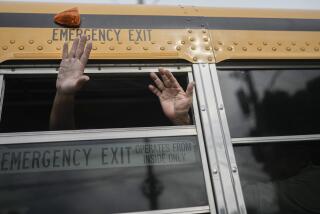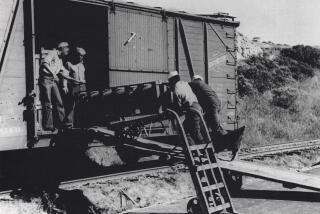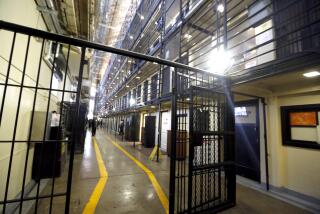15 Cubans Involved in Prison Riots Face Deportation as Incorrigibles
WASHINGTON — Justice Department officials announced Thursday the impending deportation of 15 Cuban detainees involved in prison riots last year and said they plan to speed up their case-by-case review of hundreds of other Cubans being held in federal institutions.
The 15 detainees were among the first group of 28 cases reviewed so far as part of a Justice Department agreement that ended the riots at federal prisons in Atlanta and Oakdale, La., last November. They will be sent back to Cuba “in the near future,” principally on grounds that they are incorrigibly violent criminals, authorities said. All of them committed serious crimes since coming to the United States in the 1980 Mariel boatlift.
Last November, about 3,000 Cubans being detained at the two prisons staged riots to protest the threat of deportation to Cuba. Many had criminal records or histories of mental problems and their immigration status was in doubt.
Agreement With Castro
The rioting followed an agreement with Cuban President Fidel Castro that he would accept the forced return of many Cubans who had fled on the Mariel boatlift. To quell the disturbance, Justice Department officials signed agreements with representatives of the detainees that all of those about to be sent back would be given case-by-case reviews before any deportations were ordered.
Although only 28 such cases have received special review so far, officials said that much of the first year has been occupied with getting the review process set up and paper work completed on the remaining 400 to 500 detainees at the two prisons who previously had been slated for deportation.
Next January, additional review panels will be established “so we hope to complete the entire review process within several months,” according to project director George Calhoun.
Meanwhile, hundreds of other detainees--for whom deportation never was imminent--have finished routine processing by the Immigration and Naturalization Service and have been released from detention to pursue jobs in this country.
The 15 slated for deportation are being held in a “lockdown” condition at the Talladega, Ala., correctional center to prevent further rioting. Their crimes have included murder, kidnaping, rape and drug selling since they arrived in the United States eight years ago, authorities said.
Calhoun told reporters, however, that the deportations could be delayed by further legal challenges.
Gary Leshaw, director of an Atlanta-based legal aid organization representing Mariel detainees, said that such lawsuits will be filed in hopes of blocking the first deportations since 201 Cubans were returned to their communist homeland in 1985.
Calls Rights Limited
“The special review process is still a problem,” Leshaw said. “It’s based entirely on paper work, and the detainees don’t have the right to call witnesses on their behalf. As a result some do not receive the attention they deserve.”
Cuban groups in Miami also were said to be planning protests. Rafael Penalver, an attorney who helped detainees negotiate the agreement ending the rioting last year, said that supporters plan to ask the President to intervene to allow further consideration of the cases.
Staff writer David Treadwell in Atlanta contributed to this story.
More to Read
Sign up for Essential California
The most important California stories and recommendations in your inbox every morning.
You may occasionally receive promotional content from the Los Angeles Times.










